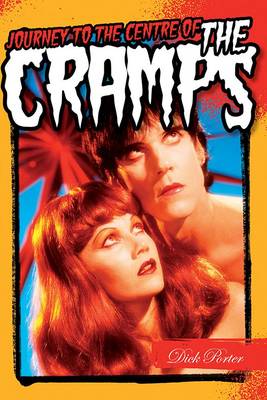The Cramps are one of the more unique American bands of the last thirty-five years. Their sound is distinctive and immediately recognisable, tapping into the raw primal energy of early rock and roll, when things were wild, sexual and more than a little bit dangerous. What made them so unique was their ability to harness disparate elements: the swagger of Elvis, the look of Z-Grade exploitation and 50’s horror, an adrenalized hillbilly throb, and the garage squall of urgent guitar.
Dick Porter’s book is exhaustively researched, with details on each tour and album, all laid out sequentially with access to all the key players. The early years are fascinating, with Porter going to pains to detail the worlds that Lux Interior and Poison Ivy Rorschach inhabited pre Cramps, pre meeting each other, pre taking on these stage names. He details the culturally barren wasteland of Ohio in the 1970’s, making it clear that the duos outrageous clothing choices, myriad of rock and roll and rockabilly influences as well as deep love trash film, were always there, and the Cramps were the logical musical extension of this lifestyle.
The other fascinating part of their early career was their subsequent relocation to New York City, which placed them at CBGB’s playing alongside the likes of Talking Heads, Blondie, and The Ramones. Porter describes the Cramps as ill fitting, outsiders, even within the early punk scene – and his description of this world is fascinating. At this time, their peers picked up record deals and began to sound more pop, but no one knew what to do with the Cramps – a predicament that was both a blessing and a curse and would continue throughout their entire career. It’s this contextual information, placing their sound and approach between their influences and environment that is so powerful and provides great insight into how the band evolved.
From this point on however Porter gets a little too caught up in the coming and going of various band members, without ever really asking why. According to Porter it’s usually due to addiction issues or wanting to expand their musical boundaries – yet there is little space given to band dynamics, or whether Lux and Ivy’s steadfast vision for the band came across as autocratic – perhaps restricting creative input from others. And whilst Porter offers some space to each member’s musical approach and their musical contributions to key tracks and albums, the contextual information that made the first part of the book so fascinating is a little thinner here.
Yet there’s an abundance of unexpected information:
“So we’ll rehearse in 3 different keys and they’ll all have different feels to them,” offers Ivy at one point. “Even if he [Lux] can’t sing all of them, maybe one of ‘em he’s straining his voice, and sometimes straining his voice makes it sound more exciting so we’ll go with that.”
Apparently they worked hard to sound so sloppy and unhinged.
Their experience with Alex Chilton who recorded their first couple of releases is also fascinating, demonstrating their desire to seek out and work with all manner of weirdos and eccentrics. Porter also addresses “psychobilly” a term the Cramps invented, then abandoned, only to see it take on a life of its own.
Porter details their battles with record companies, including IRS who they sued due to lack of royalties and poor promotion in an attempt to get out of their contract. Though he also makes some contentious claims, such as 2003’s Fiends of Dope Island is the best album of their career, something this writer firmly disagrees with, finding it a little flat. The final part of the book, including Lux’s untimely and unexpected death is treated briskly, perhaps out of respect to Lux and Ivy, and you get the sense that this moment is a victim of Porter’s refusal to buy into salaciousness or rumours. On one hand this approach is great, eschewing the urge to write a Mojo like tome of excess and divisions. Yet on the other it would be nice to dig a little deeper into the mystique, beyond the facts and figures.
What this book does do well is treat one of the most iconic and different American bands with the respect they deserve. It’s a tale of an unshakeable bond between two people; a resolute vision of what music should and could be. I’d always thought the Cramps were dropped from outer space fully formed onto earth, yet their development as a band in particular is required reading for any fan.




